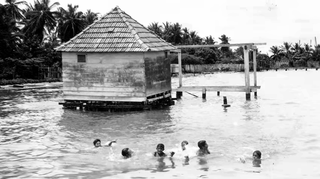State anthem of Trujillo, Venezuela | |
| Lyrics | Antonio Pacheco |
|---|---|
| Music | Esteban Rasquin |
The anthem of the Trujillo State, Venezuela, was written by Antonio Pacheco; the music was composed by Esteban Rasquin.
State anthem of Trujillo, Venezuela | |
| Lyrics | Antonio Pacheco |
|---|---|
| Music | Esteban Rasquin |
The anthem of the Trujillo State, Venezuela, was written by Antonio Pacheco; the music was composed by Esteban Rasquin.
Chorus
¡De Trujillo es tan alta la gloria!
¡De Trujillo es tan alto el honor!
¡Niquitao es el valor en la historia
y Santa Ana en la historia es amor!
I
¡Oh Trujillo! El perdón de la patria
que las armas los libre llamó:
como un ángel radiante en justicia
en tus campos ilustres brilló.
II
En tus campos es de Dios el trabajo,
en tus pompas es libre el corcel,
en tus pueblos palpita la vida,
y en tus valles se cuaja la miel.
III
Con Bolívar y Sucre, los genios
de la procera lucha inmortal
Cruz Carrillo llevó esa Bandera
a remotas regiones triunfales.

The "Marcha Real" is the national anthem of Spain. It is one of only four national anthems in the world, along with those of Bosnia and Herzegovina, San Marino and Kosovo — that have no official lyrics. Although it had lyrics in the past, they are no longer used.
The State Anthem of Coahuila was published in 2003 by the government of Enrique Martínez y Martínez. It was composed by José Luis Ulloa Pedroza.
The anthem of the Anzoátegui State, Venezuela, was written by Enrique Pérez Valencia. The melody that accompanies it was composed by César Ramírez Gómez.
The anthem of the Apure State, Venezuela was written by Amadeo Garbi. The music was composed by César Ramírez Gómez. The anthem is titled as ¡Vuelvan Caras!, as it was stated by a decree in 1978. Although it was composed in 1910, the regional government adopted it as the official anthem three years later.
The anthem of the Bolívar State, Venezuela, has lyrics written by José Manuel Agosto Méndez; the music for it was composed by Manuel Lara Colmenares. It was established as the anthem of the State by National Decree on 22 January 1910.
The anthem for Delta Amacuro State, Venezuela, was written by José Joaquín de León; the music for it was written by José Inés Richemón.
The anthem for Lara State, Venezuela, has lyrics written by Juan Bautista Oviedo; the music was composed by Pedro Istúriz.
The anthem for the Nueva Esparta State, Venezuela, was written by Miguel Ángel Mata Silva; and composed by Benigno Rodríguez Bruzual.
The anthem for the Portuguesa State, Venezuela, was composed by Fernando Eduardo Delgado; the musical part was done by Jesús Alvarado.
The anthem of the Sucre State, Venezuela, has lyrics written by Ramón David León; the music was added by Benigno Rodríguez Bruzual.
The anthem of the Táchira State, Venezuela, was written by Ramón Eugenio Vargas; the music was composed by Miguel Ángel Espinel. It was adopted in 1912, after a contest promoted by the regional government. The current anthem is the third made for the state.
The anthem of Zulia State, “Riding the Waves”, became official by Executive Order of August 15, 1909. It was the result of a public competition sponsored by the then Governor of the State, Jose Ignacio Lares Baralt, who on April 29 of that year, held a lyric and musical contest to select the words and melody of such treasured lyrical piece. The winner of the lyrical category was the famed poet laureate, Udón Perez; in the musical category, the winner was the equally renowned author, Jose Antonio Cháves. The winning entries were officially recognized on the above date, during a ceremony headed by the illustrious governor, but it was not until February 18, 1910 that the anthem was finally distributed throughout the various departments and offices of the State. With its beautiful melody, and a theme built around the ideas of freedom, peace, and hope, the anthem has remained a favorite of the people. It still speaks a revolutionary language - highly critical of dictatorship - and continues to communicate the State’s age-old abhorrence of centralist powers.

Marisela Hernandez, commonly known as Marisela, is a Mexican-American singer. In 1984, she recorded her first album at the age of 18, and continued to release albums into the 1990s. Her cover version of Barbara George's single "I Know ", titled "Ya No", peaked at number-one in the Billboard Latin Songs chart in 1990. As a child she starred in Villa Alegre.
Canción Nacional Chilena was the national anthem of Chile, between 1819 and 1847. It was written by Bernardo de Vera y Pintado and composed by Manuel Robles.
Franklin Franco Pichardo was a Dominican historian, sociologist, faculty member and politician from the Dominican Republic.
Grupo Yndio is a Mexican band from Sonora founded in 1972, by some of the members of the dissolute Los Pulpos.

Campuzano-Polanco was a prominent family from the colony of Santo Domingo with origins in Santiago de los Caballeros. During the colonial era of the Hispaniola, their members and descendants went on to occupy high political, military and ecclesiastical positions, locally and outside the Island, as well as in the metropolis of Spain. Their merits extend since the beginning and until the end of the colony.

Hope for Change is a Venezuelan political party registered by the Consejo Nacional Electoral (CNE) with the shortened name El Cambio. In the 2018 presidential election, Venezuelan pastor and party leader Javier Bertucci received enough votes to turn Hope for Change into an official political party. Aside from Bertucci, other leaders of the party include Alfonso Campos, the party's Secretary-General, Jeickson Portillo, its National Coordinator, and Luis Adames, its Undersecretary.

Un célebre especialista sacando muelas en el gran Hotel Europa was the first Venezuelan film. It was screened at the Baralt Theatre in Maracaibo, Zulia on 28 January 1897 as the second in a film block of four; the block also featured another film from Maracaibo. Little is known about the film's production, and scholars are uncertain of the identity of its director.

Muchachos bañándose en la laguna de Maracaibo is the second Venezuelan film produced, after Un célebre especialista sacando muelas en el gran Hotel Europa. It was screened at the Baralt Theatre in Maracaibo, Venezuela, on 28 January 1897.